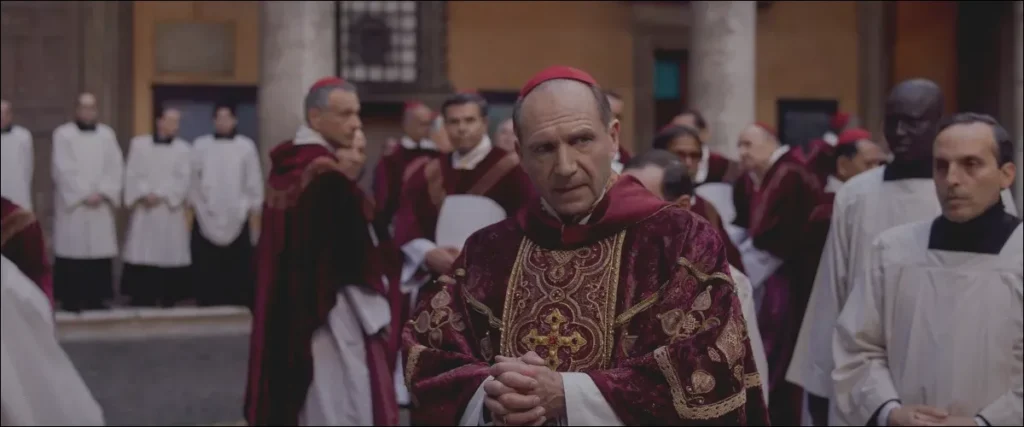Imagine, if you will, a film that delves into the arcane intrigues of Cardinal politics, where the stakes are nothing less than the spiritual leadership of millions. At first glance, you might dismiss Edward Berger’s riveting creation, Conclave, as a tedious recounting of ecclesiastical maneuvers—a mere spectator sport for those with a penchant for papal affairs. But allow me to challenge that notion: this cinematic gem is, in fact, one of the year’s most electrifying entries—infused with tension, striking visuals, unforeseen twists, and a labyrinthine web of betrayals that could level empires.
The narrative begins with the somber backdrop of a deceased pope, as a cadre of clergymen huddle around the deathbed. Yet, amidst the façade of solemnity, only Thomas Lawrence (exquisitely portrayed by Ralph Fiennes), the Dean of the College of Cardinals, seems to bear the weight of genuine grief. Lawrence, who had recently attempted to resign but to no avail, muses darkly that perhaps the pontiff anticipated his end and sought to place a trusted hand at the helm of the conclave.
For those unfamiliar, a conclave is the sacred gathering wherein Cardinals elect a new pope—a ritual symbolized by the fateful smoke that escapes the Vatican’s chimneys, heralding either hope or despair.
And do not mistake this process for a tranquil affair; it carries the same cutthroat drama found in the likes of HBO’s Succession.
As the camera begins to unfurl this drama, four contenders quickly crystallize in their aspirations. The charismatic Bellini (Stanley Tucci), the self-proclaimed liberal, envisions the Church steering towards contemporary social issues. Adeyemi (Lucien Msamati), on the brink of becoming the first Black pope, harbors shadows in his past. The ever-so-loathed Tedesco (Sergio Castellitto), a figure so obnoxious he could well be moonlighting as a nightclub bouncer, yearns for the Church to recoil to a bygone era—championing Latin rites and a staunch traditionalism that would bar the doors to progress for women and the LGBTQ+ community. Tedesco, in a blunder of assumptions, misreads Lawrence’s ethics—sparking a moment of visceral disdain when he condemns Adeyemi’s potential rise.
Then there’s Tremblay (John Lithgow), the seemingly unassuming moderate, yet whispers abound of his troubled history with resignation and ambition.
As Dean, Lawrence is shackled by confinement—news from the outside world is an unreachable luxury. His task: to navigate the high-stakes electoral maze while cloistered among his brethren.
As the votes begin to roll in, unexpected twists abound. Lawrence garners a handful of votes despite his vocal disinterest. Adeyemi edges ahead, while the shadowy figure of Benitez (Carlos Biehz), a newcomer with a harrowing history in Afghanistan, emerges as a wild card—quietly elevated to Cardinal by the deceased pope himself.
The parallel to the chaotic landscape of American politics is nothing short of deliberate. Bellini cultivates an aura of reluctance, masking a ravenous hunger for the papacy. Tremblay’s ambition blinds his moral clarity. Tedesco’s battle cry might as well be “Make the Vatican Great Again,” a phrase that could easily echo through any political rally.
In a world filled with ambition and aspiration, Lawrence’s genuine search for a candidate worthy of the papacy is met with skepticism—accusations of hidden desires swirl around him, even as his pursuit remains noble. There’s an old adage regarding ambition—the mirror’s deceit, a truth which rings eerily in the hallowed halls of power.
Berger, who drew acclaim for All Quiet on the Western Front, excels here, too. The pulsating score—a discordant quartet—carries echoes of tension through the film’s glorious recreation of the Vatican, rife with shadowy corridors and sacred spaces drenched in light. Yet, a palpable sense of claustrophobia pervades, as the Cardinals are ensconced as if they’ve stepped back into the 17th century.
Every actor shines in this tapestry, particularly Castellitto, whose antics provide comic relief amidst the drama. However, Fiennes stands out, capturing the essence of Lawrence, a man ensnared in the tempest of ambition and faith, mourning not only for the pope but also for his own turbulent beliefs. The enigmatic Sister Agnes, played by the formidable Isabella Rossellini, looms large, her perceptive presence an unsettling gauge of the unfolding drama.
Conclave is a relentless ride, a gripping tale that ensnares and captivates from its opening frame to its final, ambiguous note. It embodies the very reason why we flock to cinemas—to glimpse the profound nexus between humanity’s aspirations and its deepest flaws.

